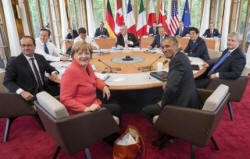|
 G7
states vow to wipe out Ebola but offer little concrete
action G7
states vow to wipe out Ebola but offer little concrete
action
 Send a link to a friend
Send a link to a friend
[June 09, 2015]
KRUEN, Germany (Reuters) - Leaders
of the Group of Seven industrial nations pledged on Monday to wipe out
Ebola but offered little in terms of concrete action, disappointing
non-governmental organizations.
|
|
 G7 leaders said in a communique at the end of a two-day summit in
the Bavarian Alps that they would offer help to at least 60 nations,
including in West Africa, over the next five years to help prevent
outbreaks from turning into epidemics. G7 leaders said in a communique at the end of a two-day summit in
the Bavarian Alps that they would offer help to at least 60 nations,
including in West Africa, over the next five years to help prevent
outbreaks from turning into epidemics.
More than 11,000 people have died in the Ebola outbreak in West
Africa since the first reported case in March 2014. The G7 said the
crisis showed it was necessary to enhance the world's ability to
prevent, detect and respond to such emergencies.
The G7 nations said they would work together to combat future
epidemics and boost or establish strategies to quickly deploy teams
of experts with a variety of skills via a common platform, but their
communique was thin on detail.

Florian Westphal, General Director of Medecins Sans Frontieres (MSF)
Germany, said the leaders had done little to ensure epidemics would
not spiral out of control in future.
"No concrete measures have been decided to strengthen emergency
response, meaning the world is no better prepared to face major
health crises and save thousands of lives," he said.
Charity Oxfam was also disappointed, saying fighting pandemics like
Ebola required "more than simply putting the emergency services on
standby".
The G7 countries said they would put money into preventing and
controlling neglected tropical diseases to meet a goal of
eliminating them by 2020, and committed to supporting research.
[to top of second column] |

Antibiotic resistance, which can be caused by misuse and overuse, is
a growing and deadly problem. Doctors and health experts have warned
for decades that rising rates of resistant bacteria are leading to
tens of thousands of deaths, threatening to nullify modern medical
advancements.
The G7 leaders said they would promote "prudent use" of antibiotics
and committed to researching issues including the development of new
antibiotics, alternative therapies and vaccines.
(Reporting by Michelle Martin; Editing by Janet Lawrence)
[© 2015 Thomson Reuters. All rights
reserved.] Copyright 2015 Reuters. All rights reserved. This material may not be published,
broadcast, rewritten or redistributed.

 |